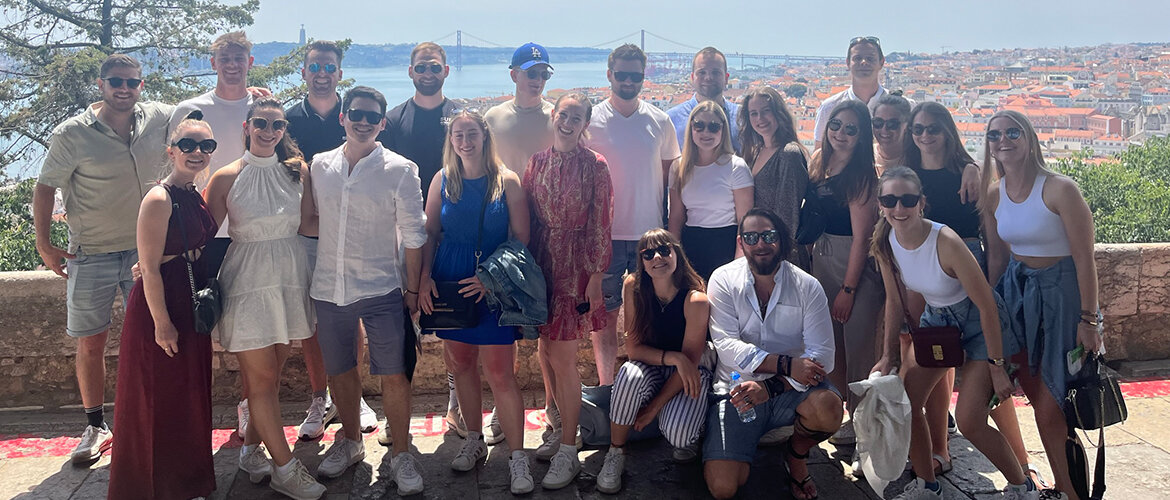Off to the south: building technology in portugal
- 12.07.2023
- International

The part-time Facility & Real Estate Management Bachelor's and Master's degree programs explored the Portuguese capital and got to know its building technology features.
The stay abroad took the Bachelor's and Master's students to Lisbon in May 2023 together with Prof. (FH) Dr. Ing. Prof. (FH) Mag. (FH) Emanuel Stocker to Lisbon.
As an ideal start to the study trip to Portugal's capital, the program began on Monday afternoon with an extensive guided tour of the entire city. The tour led past the most important spots in Lisbon on foot, while the city guide told interesting everyday facts about the city. For example, especially in the winding and hillside district of Alfama, some residential buildings are equipped with public fire extinguishers and specially marked, as in the event of a fire the fire department would find it difficult or very slow to get through the small alleyways. As it turned out during the city tour, the timing of the study trip was ideal: On the one hand, numerous squares and smaller alleyways were already decorated with colorful garlands, which had already been hung up for the city festival held in June in honor of the patron saint, Saint Anthony of Lisbon, and on the other hand, the Jacaranda tree was in full bloom with purple flowers on every corner, beautifying the cityscape.
AUSTRIAN CHAMBER OF COMMERCE
Another highlight of the study trip was the visit to the Foreign Trade Center of the Austrian Federal Economic Chamber. The students learned interesting economic aspects about Portugal and its capital Lisbon, as well as about trade relations with Austria. Tourism is obviously a lucrative economic sector in Lisbon: rental prices for tourist purposes are much higher (around two to three times) than rental prices for residential purposes, which means that many owners prefer to rent out their properties for tourists, which in turn increases rents for locals as living space becomes scarce. Due to low incomes, many residents have moved from Lisbon city center to the surrounding areas, where rents are still affordable. Although money is saved in terms of rents, significantly longer travel times have to be accepted in return, as the traffic situation in the city is particularly tense at peak times.
Exploring Lisbon
The group also visited the Mosteiro dos Jerónimos, a magnificently decorated 16th-century monastery in the Manueline style that is a UNESCO World Heritage Site. Another excursion was to the Castelo de São Jorge, a former and dilapidated fortress with a great view over the city and the river Tejo. The Austrian students felt at home when they took a gondola ride on the former EXPO site, after they realized that the cable car was built by the Austrian company Doppelmayr.
MAAT – Museu de Arte, Arquitetura e Tecnologia
The visit to the MAAT museum on Wednesday morning fascinated many of the students, on the one hand because of the unique location and appearance of the building, but also because of the versatility of the museum. The MAAT combines the early days of the industrial age with modern art in the form of a very extensive art gallery, located in a power station on the banks of the river Tejo. Visitors have the opportunity to see the original power station machinery from the beginning of the 20th century and can enter a boiler themselves. At the same time, a very wide range of different art is on display – it is not for nothing that the building itself is considered one of the city's landmarks. The museum's façade, with its reflective tiles, plays with natural sunlight, directing it into the interior of the exhibition rooms. The guided tour gave the students a better understanding of Lisbon's industrial development.
THE QUAKE
The study trip ended on Friday morning with a highlight: the QUAKE, a kind of earthquake experience center. In 1755, Lisbon was the center of a massive natural disaster, in which an immense earthquake was followed by a tsunami and an additional wildfire that destroyed most of the city center of Lisbon. The museum guided the group, partly self-taught and partly guided, through various experience and learning spaces that explained the natural disaster of the earthquake. Particularly impressive were the rooms that used simulators or video mapping to actively bring the events to life.
In conclusion, it can be said that the study trip to Lisbon was a complete success. In addition to the content relevant to the Facility and Real Estate Management degree program (Bachelor's and Master's), Lisbon offered students the opportunity to discover the cultural and architectural treasures of the city. The trip together was also an unforgettable experience and a wonderful conclusion to the shared study time of the past few months.
Links:
Study trip to Portugal.
